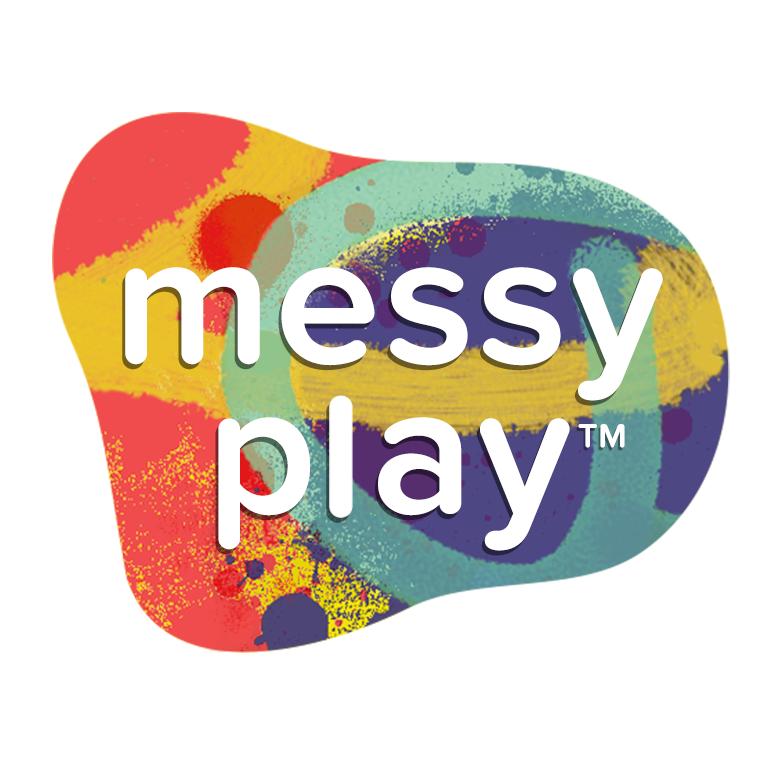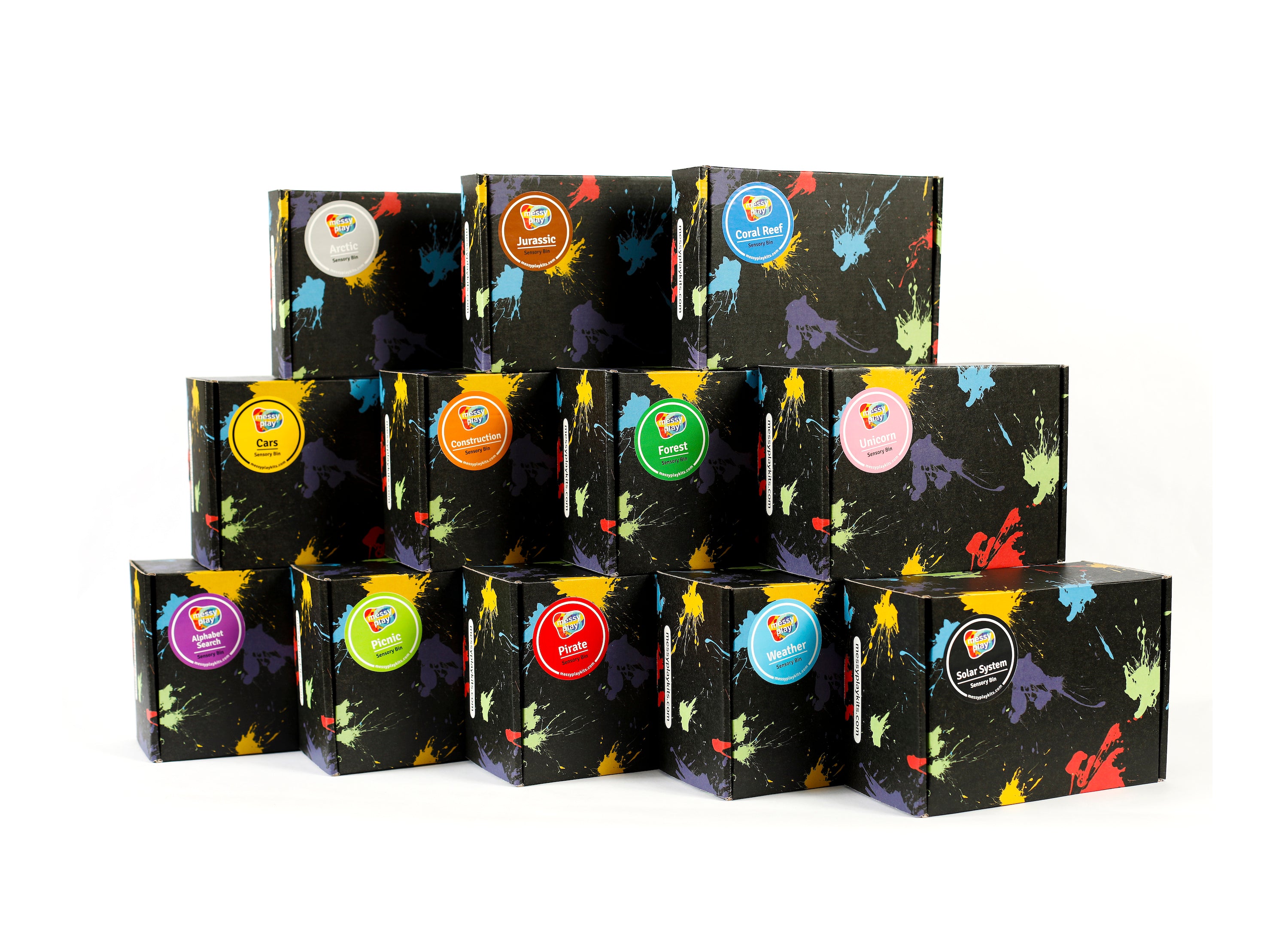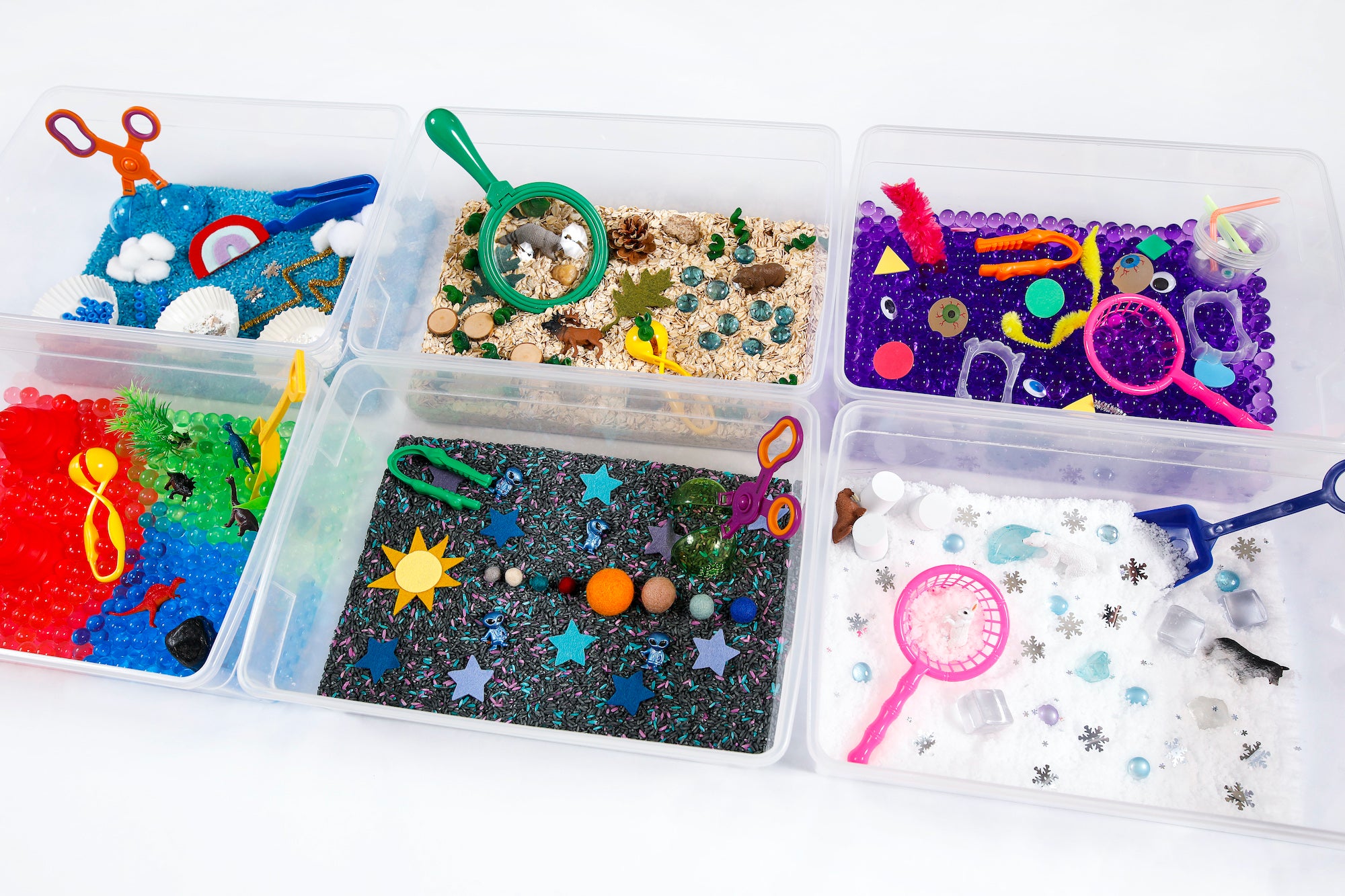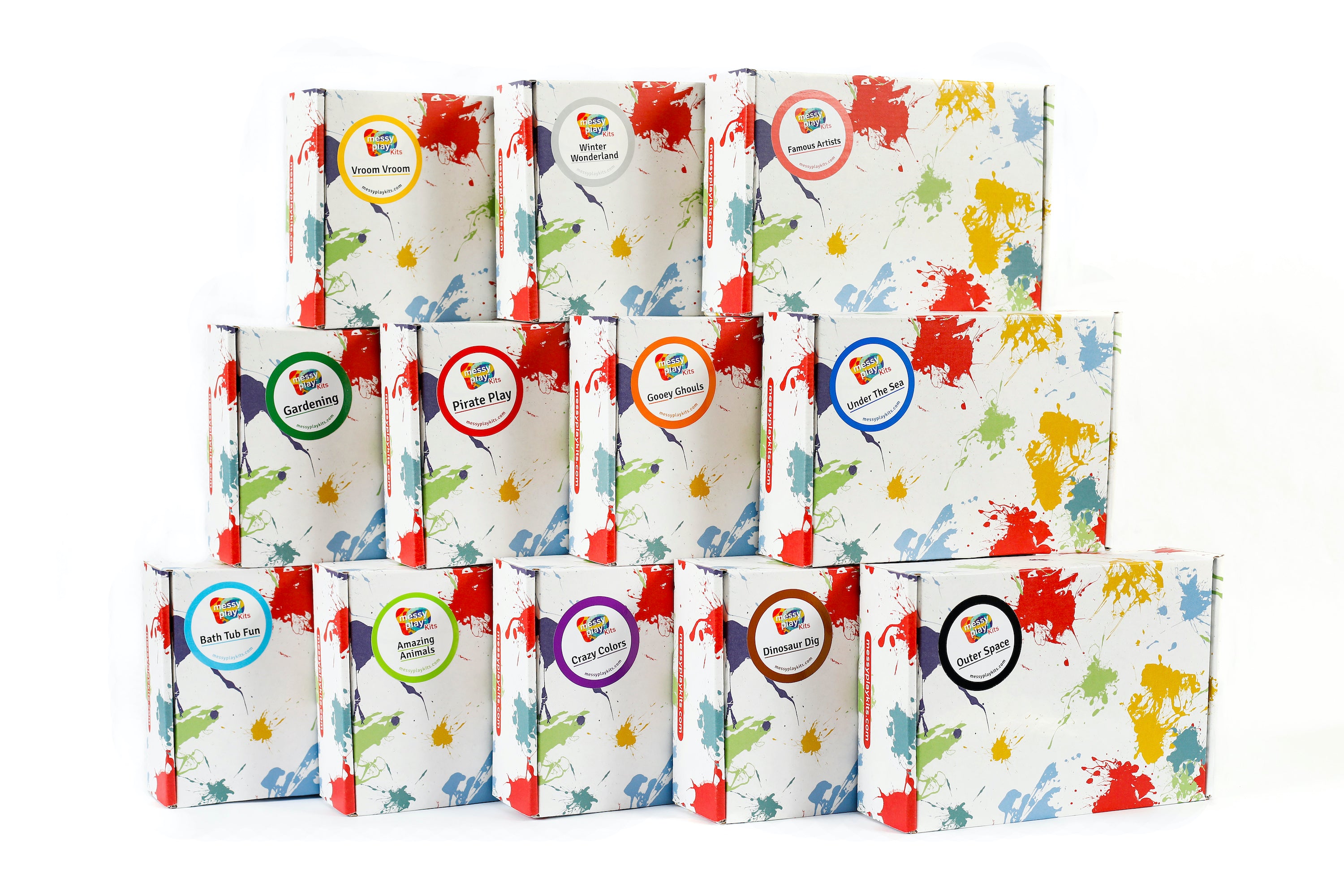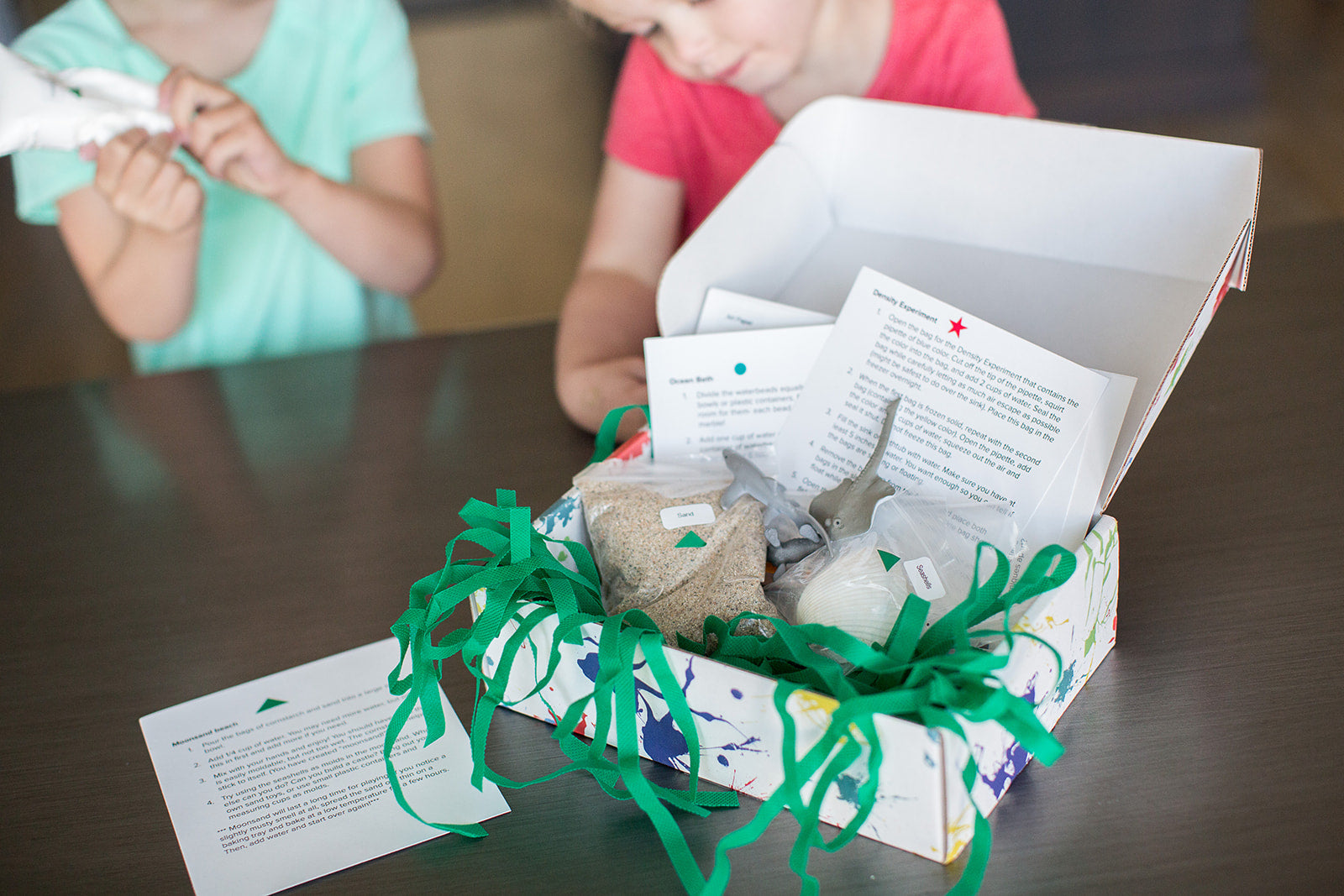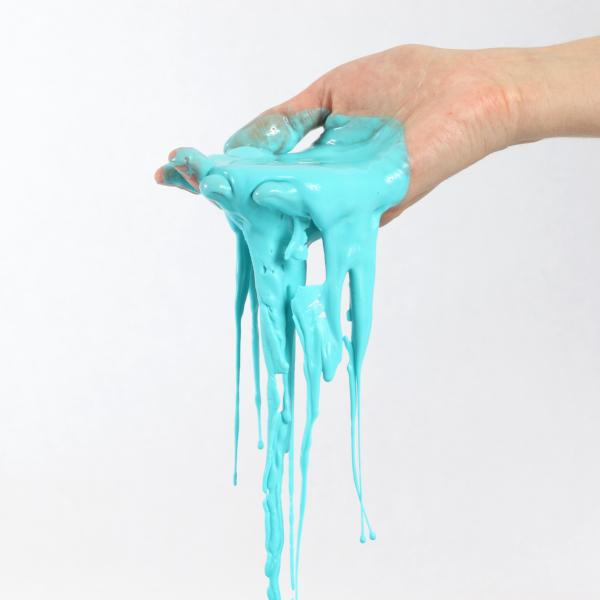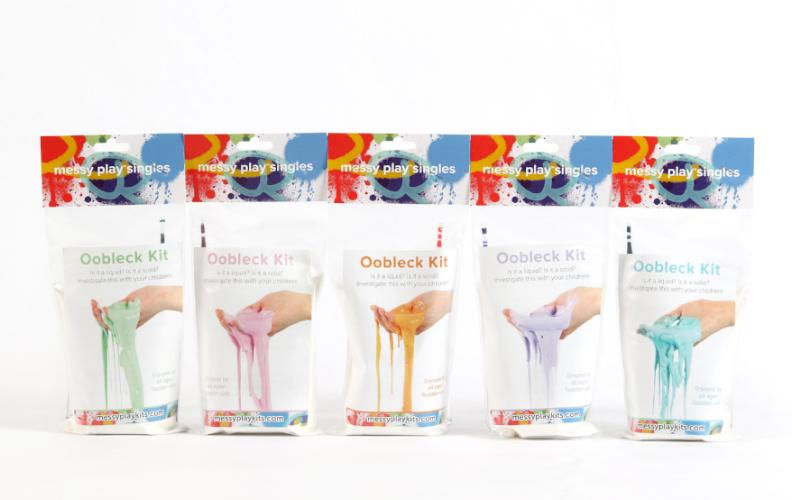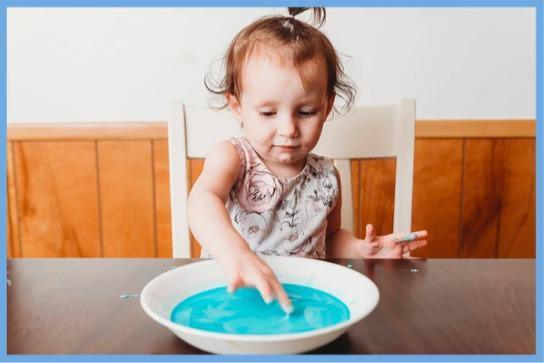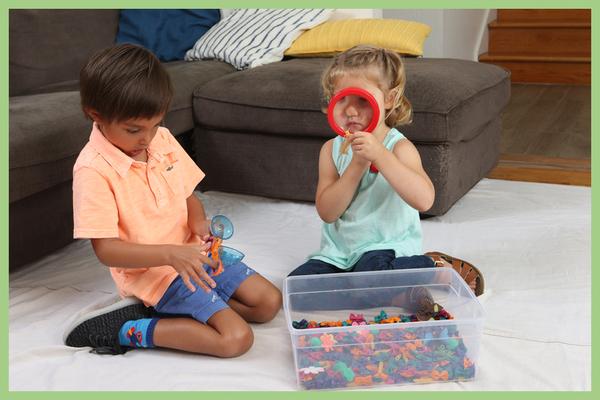8 Benefits of Sensory Play and Messy Play for Kids
Updated 10/14/2024 | Published 10/21/2020
If there’s one thing we all know, it's that kids LOVE to get messy. But did you know that you can channel this natural desire while simultaneously helping your child build crucial life skills? WIN - WIN!
What is Messy Play?
You may not know much about messy play or have just heard about it. Keep reading to learn all the benefits of messy play and how messy play promotes brain development and teaches necessary life skills in a fun way your kid will love. Messy Play fosters curiosity and lets your child explore their interests, use their senses, and develop many important skills crucial to success in life.
What is messy play: Messy Play is a style of play in which children get to take the lead, explore and learn with their hands, and experience a wide variety of textures and materials. It focuses on play-based learning and allows children to learn at their own speed.
Messy Play helps build fine motor control, problem-solving skills, foundational math and science concepts, language and vocabulary, social-emotional skills, and so much more!
Messy Play Kits are STEAM (Science, Technology, Engineering, Art, Math) activity kits that help you provide sensory play without having to stress over the how and what. They provide all materials and instructions necessary so you can enjoy the play with your kids!

(This kit is part of the monthly subscription)
Why messy play and sensory play are important: Children learn best when they actively engage with their environment and use all their senses. Young children are in a very concrete stage of development—they need to SEE and FEEL their world in order to understand it. By engaging in sensory play combined with skilled adult partners, they learn about a variety of textures, materials, and properties in the concrete manner they understand best.
Toys are fun but they can be restrictive because they have a specific intended use or function. They are good for exploring certain skills, but messy and sensory play with open ended materials like rice, slime, or play dough help kids learn to play independently, increase attention span, provide opportunities to problem solve, and build self-confidence and self-esteem. Plus your kids will learn and use real life skills such as measuring, pouring, experimenting, etc.
Playing IS learning for young children. Playing is their job!
Alright, let’s get messy!
Top Educational Benefits of Sensory and Messy Play
Our Messy Play Kits, Sensory Bins, and other activity kits are designed to engage and sharpen your child's skills. These are just a few of the many benefits of messy play and sensory play:
1. Supports Cognitive Development
Messy play and sensory play support your little one’s cognitive development - the ways they think, explore and figure things out. It offers your child a chance to figure things out for themselves! Every time they solve a problem, they reinforce that ability and build self-confidence. Messy play also offers a fun chance for kids to learn cause and effect through observation and hands-on experience. By exploring the physical materials, small children develop spatial awareness too.
2. Fosters Math Skills
Messy play and sensory play also develops and nurtures your little one's math skills - laying the foundation for a lifetime of important math concepts. Engaging hands-on activities offer opportunities to count and measure which is much more fun than counting by rote and demonstrates the real-life application of math! Your kids will also identify and describe shapes, practice matching, and compare objects, all which are early steps in recognizing patterns and learning numbers.
3. Lays a Foundation in Science
To a child, chemical reactions look like magic! You can encourage that fascination while also building understanding of underlying and foundational science principles. Messy and sensory play engage your child’s scientific curiosity and development. Through play, your child will learn about physical properties, chemical reactions, experimentation, and how to make predictions and observe results - the core of the scientific method!
⇨ Science isn’t just for older kids! Curious children of all ages who love to tinker can excel by learning preschool science concepts. Learn four ways messy play promotes a foundation in science.
4. Encourages Social Development
Social development is the way children connect with others and learn to get along. When kids engage in messy play with others, they learn to collaborate to solve problems together. They will communicate (verbally and non-verbally) to achieve their messy goal. They'll also learn to share tools and space. Messy play is fun for your kid and it helps support your child’s social development too.
⇨ Learn how to improve your child's social skills and facilitate social development through play.
5. Creates a Sense of Responsibility
We all want our kids to grow up to be confident, independent, and responsible. Sensory and messy play support your child as they develop a sense of responsibility, which will help them feel more confident and secure. Watch your child develop a sense of accomplishment as they learn to follow age-appropriate instructions and learn to abide by rules and boundaries. Involve your child in messy play setup and clean up to empower them with self-help skills and reinforce healthy patterns of cleaning up after play in the future (which means less cleaning up for you!)!
⇨ Ready to quit the “Clean that up, please!” phase? Learn how teaching responsibility for kids can be easy when you know how to effectively motivate your kid!
6. Improves Fine Motor Skills
Another messy play and sensory bin benefit is improving your child’s fine motor skills. There are plenty of interesting objects and kid-sized tools for your child to grasp. Facilitate your child’s physical development, including hand-eye coordination, grasp strength, dexterity, and pinching and while they use the muscles in their wrists, hands, and fingers to squeeze, scoop, pour, and pick up objects. These fine motor skills lay the foundation for pencil grip and writing skills in the future.
⇨ Fine motor skills development is a crucial part of your child’s process of growing up! Learn how messy play enhances a variety of different fine motor skills.
7. Promotes Creativity
Inspire curiosity and foster creativity with messy play using open-ended art and craft materials. Messy play is explorative and spontaneous -- there is no scripted story or prescribed action that your child must take. Open-ended play can support flexible thinking, resilience, and independence! Focus on the process of creating art to allow your child to discover their own techniques without feeling pressure to create a particular thing.
⇨ Creative play is a great way to keep your child engaged while improving resilience and self-confidence. Learn how to incorporate this magic into your day!
8. Nurtures Language Skills
Messy play can also support your child’s linguistic development. As your child plays, narrate their actions and describe what they’re doing. This teaches them to use words for description and introduces new vocabulary. Describe your child’s messy play session using the senses - discuss color, temperature, texture, weight, shapes, smells, hardness, patterns, sounds, etc. Experiencing the meaning of these words firsthand will help your child understand them.
Benefits of Messy Play for Kids (Age 5-8)
- Reinforces concepts and skills learned at school in a tangible way; this improves a child’s understanding of scientific concepts, vocabulary words, art, foundational math skills, etc.
- Messy Play facilitates learning by allowing children hands-on exploration of concepts that are hard to understand. For example, you can demonstrate density by allowing children to play with objects that sink or float in a sensory bin of water, which helps them visualize and SEE density rather than just trying to imagine it.
- Allows children to express themselves creatively and explore a variety of art mediums while focusing on process-based art.
- Creates a sense of serenity children; sensory play can be very calming (think of a zen garden). This helps with emotional regulation.
- Fosters patience and connections with nature and the world around them.
- Improves fine motor control
- Benefits of slime include learning about material properties and how they change, following a recipe and instructions, playing within boundaries or limits (ie: slime stays in the kitchen), tactile stimulation, experimentation, creative representation.
- Enhances the home-school connection: when you reinforce learning that happens at school with learning that happens at home, you strengthen the connection between your child’s most important environments. Home can be a learning environment as well, and you and your child’s teacher work together to help them grow.
- Builds a sense of responsibility when they participate in set up and clean up and take ownership of their activities.
SHOP MESSY PLAY KITS →

Benefits of Messy Play for Preschoolers (Age 3-5)
Preschoolers are working on building their foundational skills, such as moving their bodies, learning about the world around them, practicing basic social interactions, and developing crucial emotion regulation skills. Messy and Sensory Play can help with all of these skills.
Sensory bin benefits include:
- Building fine motor control by scooping and dumping
- Learning concepts such as “full” and “empty”
- Basic sorting and classification (which are foundational math skills)
- Creative or fantasy play when they act out imaginary scenes
- Learning to share space and materials with other children
- Emotion regulation- sensory play can be calming for many people
- Connecting the senses (sight, sound, touch, taste, smell)
- Building a strong sense of self when they are in control of the play
- Building a sense of responsibility when they must follow rules and guidelines for play
SHOP SENSORY BINS →
Ideas for messy play activities
Some links below are affiliate links. When you buy through our links, we may earn a commission. Learn more →
Outside - The park or your back yard open up an entire world of sensory play opportunities. Dig in the mud, pick up sticks, arrange leaves, etc. Also be sure to try the color-changing slime kits that change in sunlight!
Bath Tub - Keep the mess contained and make clean up easy by taking your messy play to the tub. Try bath crayons, or coloring the bath water with these easy and non-toxic bath color tablets. Another idea is to make colorful shaving cream “paint” by mixing any shaving cream with my favorite liquid watercolors. Did you know there is a Bath Tub Fun Messy Play Kit?
Sand Box - Dig, scoop, fill, dump, bury, build! The possibilities are endless! If you don’t have the space for a sandbox, try the Dinosaur Excavation Sensory Bin (which includes cornmeal) or a Sand Table. Remember to let your child play with sand dry and wet for different sensory experiences.
Dough, Slime, Oobleck - Play dough is a well known material and easy to find at the store or make yourself. I personally love Squishy Dough and source play dough for my kits from them (Love supporting another awesome small business)! Slime is stretchy and squishy and so incredibly satisfying to play with (and now can be made to change colors as you play!). Oobleck is smooth, soft, cold- it’s both a liquid and a solid, depending on how you interact with it. Each provides different sensory experiences for your child so try them all!
Art and Crafts - Let your child get messy with paint and glue! These paint brushes are great and come with both round and flat brushes. They are easy to use but not so fancy you can't toss them when you're done. Plus their chunky size is easier for younger kids to grasp. Or try the Crazy Colors Messy Play Kit which comes with materials and instructions for four fun activities. You'll also get access to detailed photo instructions, educational resources, and extra ideas for play!
Pantry - Brown rice, white rice, dry pasta, and dry lentils are a few great base materials for creating your own sensory bins. Raid the cupboards for homemade play dough ingredients! Or make it easy with the convenience of sensory bins shipped right to your door with a monthly sensory bin subscription box!
You may be hesitant to let your child explore messy play, but there are tons of ways to make messy easy to clean up (check out this blog post about keeping the mess contained!)
Browse through all the posts about getting started with messy play!
Ready to get messy? Shop the full collection of convenient and ready-to-play Messy Play activity kits and fun themed sensory bins!
